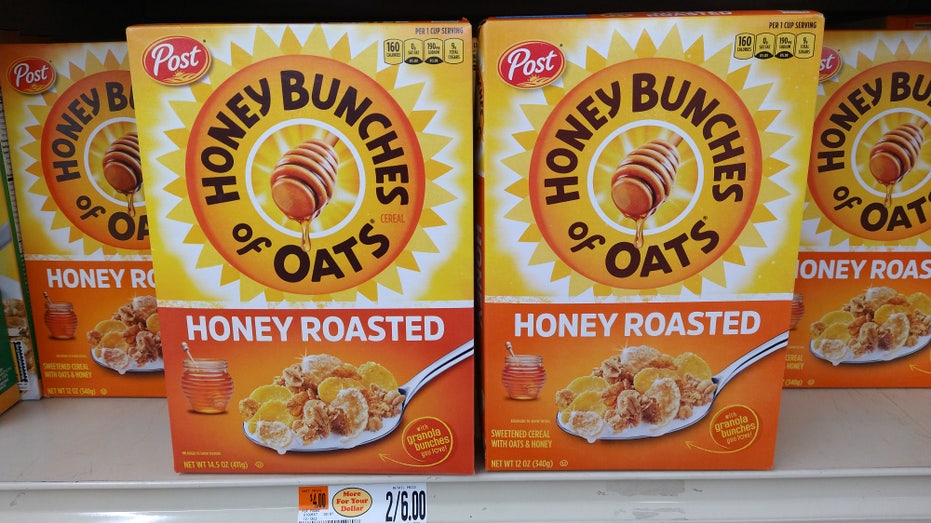'Shrinkflation' dupes customers as companies seek profits during inflation spike
Consumers may fail to notice 'shrinkflation' at stores, analysts warn
'Shrinkflation' hits consumers nationwide
David Lee Miller reports on often-unnoticed economic practice
Once you notice it, you’ll see it everywhere.
Rather than risk losing business by raising prices, corporations are turning to "shrinkflation" to pad their profits while consumers are left in the dark about the changes.
Corporations are taking advantage of the tightening post-pandemic economics to downsize their products, often while prices remain unchanged or even rise, according to experts who spoke with Fox News. The practice, known colloquially as "shrinkflation," involves lessening the unit size or weight to turn more profits per package.
"Shrinkflation or downsizing has been going on for decades," consumer watchdog Edgar Dworsky told Fox News. "I mean, I first noticed it, frankly, when I was a kid and my Mounds candy bar was no longer two ounces."
Dworsky, who founded the websites ConsumerWorld and MousePrint to document the abuses and overreaches of consumer goods markets, said the effect of downsizing is essentially the same as raising prices.
Stores impacted by 'shrinkflation' as companies reel from economic struggles, staffing shortages
Brian Brenberg joins 'Kennedy' to discuss why top brands are charging the same prices for smaller quantities of product
"Well, it’s the same as raising the price, except they’re doing it in a more inconspicuous manner," he said. "They don’t get the negatives of a price increase. They don’t get the consumer complaints. They don’t risk the consumer going to a competitor."
Consumers, Dworsky said, are generally not as sensitive to changes in net weight or unit count as they are to changes in price. With downsizing, corporations found an underhanded way to increase their profits at the detriment of the consumer.
The current wave of downsizing exists in an environment where inflation, including rising prices for home goods, is battering everyday Americans, and many corporations are riding high after record profits in 2021.
U.S. COMPANIES ARE THRIVING DESPITE THE PANDEMIC – OR BECAUSE OF IT
"Perhaps profitability is getting squeezed by surging input costs," Jake Oubina, a senior partner at Piper Sandler, told Fox News. "Companies have to respond to this. I think part of the reason you’re seeing shrinkflation, which is something that’s been around for the better part of the pandemic, at this point is accelerated again because food prices have gone up in the wake of the Russian invasion of Ukraine."
'Shrinkflation' hits grocery stores as companies reduce product sizes amid rising costs
FOX Business' Grady Trimble reports from Chicago's Happy Foods supermarket with a closer look at what you're getting less of.
Across the supply chain, prices are up, especially for fuel. It’s one of the primary reasons brands and manufacturers cite when Dworsky presses them on the downsizing of their products.
GET FOX BUSINESS ON THE GO BY CLICKING HERE
"They’ll say, ‘Well, the raw material costs have gone up, we’re paying more to get the goods to the store because of high gasoline prices,’" Dworsky said. "Then they’ll say a competitor did it. … Manufacturers know if they take a little bit out of the product, consumers may not notice it. And they’ve thus passed on that price increase without a lot of negative reaction from customers."
In a two-part newsletter through one of his websites, Dworsky cited 12 products, sent to him by readers, that were downsized on the shelves of their local grocery.

Two cereals, identical in price but not in unit weight, show shrinkflation on grocery shelves, according to analysts. (ConsumerWorld.org)
Fox News reached out to the parent companies of Angel Soft toilet paper, Miracle-Gro all-purpose plant food, Breton crackers, Kleenex, Honey Bunches of Oats, Haribo Goldbears and Arm & Hammer laundry detergent, all of which were featured in his newsletter. Of these corporations, only Georgia-Pacific, the makers of Angel Soft toilet paper, responded to requests for comment. A spokesperson for Georgia-Pacific told Fox News that the changes to their product were not a result of shrinkflation and that they added more rolls to some of their packaging and reduced the suggested retail price for others.
CLICK HERE TO READ MORE ON FOX BUSINESS
While the current wave of downsize may not last forever, Dworsky is confident it’ll return when the economy tightens in the future. For corporations with shareholders to appease, if it makes dollars it often makes sense.
"Manufacturers know if they take a little bit out of the product, consumers may not notice it," Dworsky said. "And they’ve thus passed on that price increase without a lot of negative reaction from customers."






















